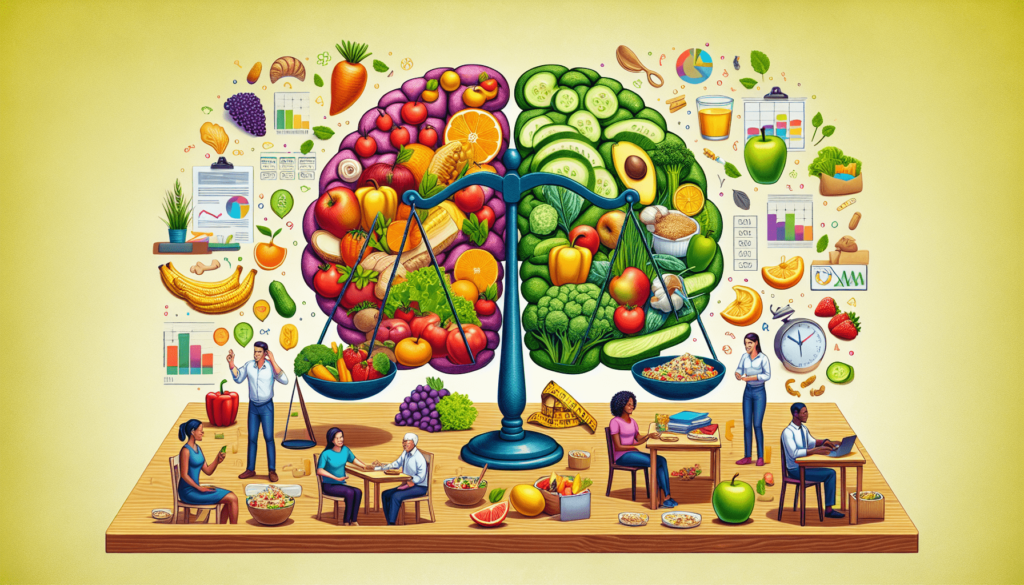Are you looking for a way to achieve happiness and success? Look no further than your diet. Yes, that’s right, what you eat can have a significant impact on your overall well-being and achievements. In this article, we will explore the connection between your diet and your mental and physical health. Discover the mindset shifts, motivation techniques, and emotional eating strategies that will help you achieve your weight loss and fitness goals. With a little help from Simply Weight Loss Secrets, you’ll be on your way to a happier and more successful life.

The Connection Between Diet and Happiness
Diet and Mood
Your diet plays a significant role in influencing your mood and overall emotional well-being. Research has shown that people who follow a healthy and balanced diet tend to experience less stress, anxiety, and depression. On the other hand, consuming a diet high in processed foods, sugar, and unhealthy fats has been linked to an increased risk of mental health disorders.
Diet and Emotional Well-being
The food you eat can directly impact your emotional well-being. Certain nutrients in your diet, such as omega-3 fatty acids, have been found to have a positive effect on mood regulation and reduce symptoms of depression. Additionally, a diet rich in fruits, vegetables, and whole grains provides essential vitamins and minerals that promote brain health, supporting emotional balance.
Diet and Mental Health
Maintaining a healthy diet is crucial for optimal mental health. Studies have shown that individuals who adhere to a Mediterranean-style diet, which is rich in fruits, vegetables, whole grains, lean proteins, and healthy fats, have a lower risk of developing mental health disorders like depression and schizophrenia. This suggests that dietary patterns can have a significant impact on mental well-being.
The Link Between Diet and Success
Diet and Energy Levels
Your diet directly affects your energy levels throughout the day, ultimately impacting your ability to succeed in various aspects of life. Consuming a diet consisting of whole foods, complex carbohydrates, and lean proteins provides sustained energy, allowing you to stay focused, alert, and motivated. On the other hand, foods high in refined sugars and unhealthy fats can lead to energy crashes and decreased productivity.
Diet and Cognitive Function
A healthy diet is essential for optimal cognitive function, including memory, concentration, and problem-solving. Nutrients like omega-3 fatty acids, found in fatty fish and walnuts, have been shown to enhance cognitive abilities and improve brain health. Additionally, consuming a variety of fruits, vegetables, and whole grains provides antioxidants that help protect brain cells and promote mental clarity.
Diet and Productivity
Choosing the right foods can significantly impact your productivity levels. Processed foods and sugary snacks may provide a temporary boost in energy but can lead to a decrease in productivity in the long run. On the other hand, a diet rich in protein, complex carbohydrates, and healthy fats helps maintain steady blood sugar levels and sustained energy, allowing you to stay focused and productive throughout the day.
Choosing the Right Diet for Happiness and Success
Balanced Diet
A balanced diet is key to both happiness and success. This means including a variety of foods from all food groups, including fruits, vegetables, whole grains, lean proteins, and healthy fats. Aim to create a well-rounded plate that encompasses diverse nutrients to support both physical and mental well-being.
Whole Foods
Choosing whole foods over processed foods is essential for a healthy diet. Whole foods are minimally processed and contain more nutrients, fiber, and antioxidants compared to their processed counterparts. Incorporating whole foods like fruits, vegetables, whole grains, and lean proteins into your diet can contribute to a happier and more successful life.
Hydration
Staying hydrated is often overlooked but is crucial for optimal physical and mental functioning. Dehydration can lead to decreased energy levels, poor concentration, and cognitive decline. Make sure to drink enough water throughout the day to stay properly hydrated and support your overall well-being.
The Role of Macronutrients in Boosting Happiness and Success
Protein
Protein is a macronutrient that plays a vital role in building and repairing tissues, including muscles, hair, and nails. It also helps regulate hormones and enzymes that influence mood and energy levels. Including adequate protein sources like lean meats, poultry, fish, legumes, and dairy products in your diet can contribute to both happiness and success.
Carbohydrates
Carbohydrates are the body’s primary source of energy. They provide fuel for muscle and brain function. Choosing complex carbohydrates like whole grains, fruits, and vegetables over refined carbohydrates helps maintain stable blood sugar levels, providing sustainable energy throughout the day. This supports both mental and physical well-being.
Healthy Fats
Healthy fats, such as omega-3 fatty acids, are essential for brain health and emotional well-being. These fats are found in fatty fish, nuts, seeds, and avocados. Including sources of healthy fats in your diet helps support optimal brain function, improve mood, and enhance overall happiness and success.

This image is property of images.unsplash.com.
The Importance of Micronutrients for Optimal Mental Well-being
Vitamins
Vitamins play a crucial role in maintaining mental well-being. Vitamin B complex, for example, helps in the production of neurotransmitters that regulate mood and energy levels. Vitamin D is also essential for brain health and has been linked to a lower risk of depression. Including a variety of whole foods that are rich in vitamins, such as fruits, vegetables, and whole grains, ensures you get the necessary nutrients for optimal mental well-being.
Minerals
Minerals are essential for various bodily functions, including brain health. Magnesium, for instance, plays a role in regulating neurotransmitters and has been linked to reducing symptoms of anxiety and depression. Other important minerals for mental well-being include zinc, iron, and calcium. Consuming a diverse range of whole foods can help provide the necessary minerals for optimal mental health.
Antioxidants
Antioxidants are compounds that help protect the body’s cells, including brain cells, from damage caused by free radicals. Fruits and vegetables are excellent sources of antioxidants, which contribute to reducing inflammation and promoting brain health. Including a variety of colorful fruits and vegetables in your diet ensures you receive a wide range of antioxidants to support optimal mental well-being.
The Role of Gut Health in Emotional Resilience and Achievement
The Gut-Brain Connection
The gut-brain connection refers to the bidirectional communication between the gut and the brain. The gut contains millions of neurons that produce and release various neurotransmitters, including serotonin, which plays a crucial role in mood regulation. A healthy gut microbiome is essential for optimal mental well-being and emotional resilience.
The Impact of Probiotics
Probiotics are beneficial bacteria that support a healthy gut microbiome. Research has found that probiotics can help improve mood and reduce symptoms of anxiety and depression. Including probiotic-rich foods like yogurt, kefir, sauerkraut, and kimchi in your diet can promote a healthy gut microbiome and support emotional resilience.
Foods That Support Gut Health
Certain foods can support gut health and promote a healthy gut microbiome. Fiber-rich foods, such as fruits, vegetables, whole grains, and legumes, nourish the good bacteria in your gut. Additionally, fermented foods like yogurt, kefir, tempeh, and miso contain probiotics that contribute to a healthy gut microbiome. Including these foods in your diet supports emotional resilience and achievement.

Strategies to Overcome Emotional Eating and Stay on Track
Recognizing Emotional Triggers
Emotional eating, or eating in response to emotions rather than hunger, can interfere with your ability to maintain a healthy and balanced diet. Recognizing emotional triggers, such as stress, boredom, or sadness, can help you identify patterns and develop healthier coping mechanisms. Practice mindfulness and emotional awareness to distinguish between physical hunger and emotional cravings.
Practicing Mindful Eating
Mindful eating involves paying attention to the present moment and the sensory experiences associated with eating. By slowing down, savoring each bite, and listening to your body’s hunger and fullness cues, you can develop a healthier relationship with food. Mindful eating promotes self-awareness, reduces overeating, and supports long-term success in maintaining a healthy diet.
Seeking Support
Seeking support is crucial when trying to overcome emotional eating and stay on track with a healthy diet. Reach out to friends, family, or a professional who can provide guidance and motivation. Joining a support group or seeking therapy can also be beneficial in addressing underlying emotional issues and developing healthy coping strategies.
Finding Motivation to Stick to a Healthy Diet
Setting Realistic Goals
Setting realistic and achievable goals is essential for staying motivated on your journey towards a healthy diet. Break your larger goals into smaller, manageable steps, and celebrate each milestone along the way. By setting realistic goals, you can maintain motivation and track your progress, ultimately leading to long-term success.
Rewarding Progress
Rewarding yourself for sticking to a healthy diet can provide motivation and reinforcement. Celebrate your accomplishments with non-food rewards, such as treating yourself to a massage or buying yourself new workout gear. By acknowledging your achievements, you’ll stay motivated and encouraged to continue making positive choices.
Creating a Supportive Environment
Creating a supportive environment is crucial for maintaining motivation and sticking to a healthy diet. Surround yourself with individuals who share similar goals and values. Consider joining a fitness class or cooking club where you can connect with like-minded people and find support. Additionally, make your home a place that promotes healthy habits by stocking it with nutritious foods and creating a designated space for exercise.

Incorporating Exercise with Diet for Optimal Results
The Benefits of Physical Activity
Exercise and diet go hand in hand when it comes to achieving optimal results. Regular physical activity has numerous benefits, including improved mood, increased energy levels, and enhanced cognitive function. Exercise also helps maintain a healthy weight and supports overall well-being. When combined with a healthy diet, exercise maximizes the potential for happiness and success.
Finding an Exercise Routine
Finding an exercise routine that suits your preferences and lifestyle is crucial for long-term adherence. Consider activities that you enjoy, such as walking, running, swimming, or dancing. Experiment with different forms of exercise to find what keeps you engaged and motivated. Remember, consistency is key, so choose activities that you can realistically incorporate into your routine.
Combining Exercise and Nutrition
Combining exercise and nutrition works together to optimize overall health and well-being. Your body requires proper fuel in the form of a healthy diet to support physical activity and recovery. Ensure you consume enough macronutrients, vitamins, and minerals to meet the demands of your exercise routine. This combination enhances your body’s ability to perform and supports long-term success in achieving both physical and mental goals.
Maintaining a Healthy and Happy Relationship with Food
Avoiding Restrictive Diets
Restrictive diets that severely limit certain food groups or impose strict rules can lead to negative psychological effects and an unhealthy relationship with food. Instead of following fad diets, focus on a well-rounded, balanced approach that incorporates a variety of foods from all food groups. This allows you to enjoy a wide range of flavors and nutrients while maintaining a healthy and happy relationship with food.
Finding Balance and Moderation
Maintaining balance and practicing moderation is key to a healthy and happy relationship with food. Allow yourself to indulge in your favorite treats occasionally while predominantly choosing nutritious whole foods. Finding a balance that works for you helps avoid feelings of deprivation and guilt, ultimately leading to a sustainable and enjoyable approach to eating.
Enjoying Food without Guilt
Guilt should have no place in your relationship with food. It’s important to enjoy meals and snacks without feeling guilty or judged. Cultivate a positive mindset around food by focusing on the nourishment it provides for your body and soul. Shift your perspective to appreciate the pleasure and enjoyment of eating, allowing yourself to savor each bite guilt-free.
In conclusion, maintaining a healthy diet is not only essential for physical health but also plays a significant role in promoting happiness and success. By understanding the connection between diet and various aspects of well-being, such as mood, mental health, energy levels, and cognitive function, you can make informed choices that support your optimal self. Aim for a balanced diet, incorporate whole foods and hydration, understand the importance of macronutrients and micronutrients, and prioritize gut health. Additionally, address emotional eating, find motivation, and create a supportive environment. Combine exercise with a healthy diet for optimal results, and most importantly, maintain a healthy and happy relationship with food, embracing balance, moderation, and self-compassion.


